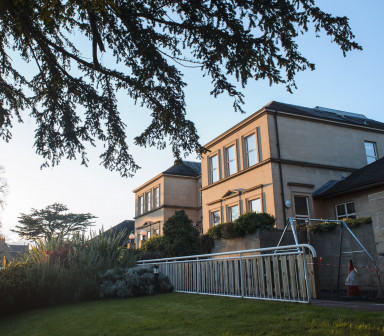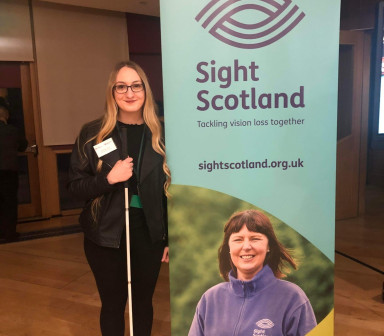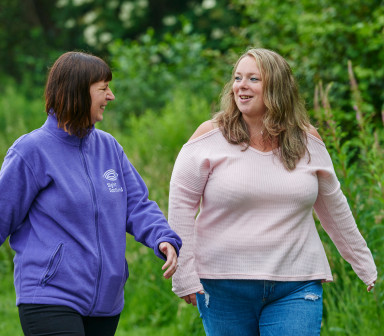Samantha Gough, an inspirational visually impaired athlete from Edinburgh, says she wants to inspire others with visual impairment to take up sports and says having a disability shouldn’t be a barrier to competing.
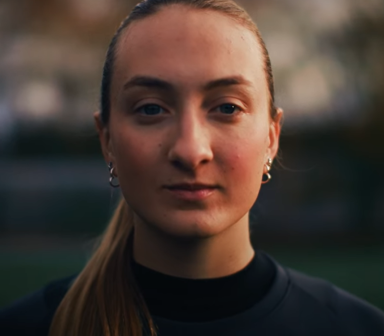
Sam, 21, has been visually impaired from birth due to cerebral visual impairment (CVI) – a condition which means the eyes are healthy, however the brain’s visual pathways do not work, resulting in sight loss. Sam’s vision started to get worse in 2014 and as result she had to relearn how to live and needed mobility training to find her way around the world again.
She says having a flexible placement with Sight Scotland’s Royal Blind School in Edinburgh, where she split her schooling between her mainstream school and the Royal Blind School, was life changing as it gave her the skills and confidence to start living her life again.
“I am now just so busy, I am England Blind women’s football captain, I am on the rowing pathway for Great Britain, I swim, I horse ride, play goalball, but I wouldn’t have been able to do any of this without the help and support of Sight Scotland and the Royal Blind School."
Sam explains:
“It wasn’t very long ago that I didn’t think I could take part in sport at all, I went from being registered partially sighted to severely sight impaired and was basically excluded from all sport as a result. Instead of asking me how we can support you, I was seen as a problem. If you told me then, what I would be doing now, I would never have believed you and it really does show people what can be achieved if you are given the right support.
“The Royal Blind School was amazing for me, as I was given tailored specialist teaching and the opportunity to learn independent living skills. All the teachers were amazing and showed me how I could live my life again independently, yes, I still need some help, but I have the confidence to go out and try new things and really push myself to be the best I can be. I really want to show others what can be achieved, and that having visual impairment does make you different, but it is not a barrier to do the things you enjoy.”
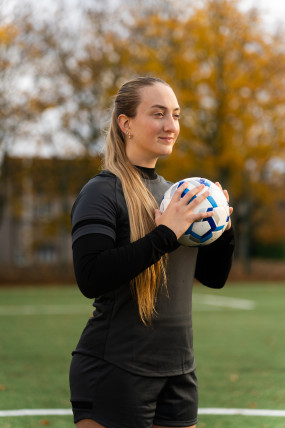
Sport and sight loss
“As soon as I got the chance to try blind football, I absolutely fell in love with it. It was something I never thought I would get the chance to do due to my visual impairment, and now I am the captain of England and played at the inaugural IBSA Women’s World Championships. It’s mind-blowing when you think about it.
“I really do think sport saved my life, as it gave me goals to inspire to, it gave me confidence. Not only the football, but I also won bronze with Great Britain in goalball at the U19s Para Youth Games and I am currently on the pathway for Great Britain at rowing. I got involved with rowing at the Royal Blind School when my teacher asked if anyone fancied giving it a go; they basically said to me you are involved with so many sports already that why not try one more. I went along to my first rowing session and kind of fell in love with it. I was then invited to the GB starter programme and have now been through all the stages of the pathway for GB rowing. I got my first gold medal last year at the British Indoor Championships, which was kind of crazy having been only nine months in the sport. My ambition is to take part in the Paralympic games. I absolutely love doing what I do, even if I have to travel miles and miles to do it! Sport is more than just playing and competing, it gives you the feeling of being needed, feeling wanted and feeling important. It is so good for your mental health and wellbeing.”
Advocacy work
“I have struggled with mental health and sport saved me; I really believe this. So I am determined to show others what is possible if you get a little support. There definitely remains a lack of awareness around visual impairment and disability in sport, with blind and partially sighted people twice as likely to be inactive as people without sight loss. I think it’s so important to have role models to look up to and I’m so proud if I can play my part in this.
“Doing advocacy work for Sight Scotland and going into schools talking about my disability, but also all my achievements, has played a massive part in my journey, and has been huge for my confidence. It has showed me that I can speak up with my visual impairment, and that I can inspire others to ask for help. I also love using my platform on social media to make videos to try and engage and educate more people about visual impairment, and vision impairment in sport.”
Sam and the Royal Blind School
“I have been involved with Sight Scotland since I found out I was visually impaired. My Mum already knew about the charity, and what support they offered. Going to the Royal Blind School was a game-changer in so many ways; it made me so much more independent and taught me to accept myself with my disability, this was such a massive factor in my journey. Before coming to the school I didn’t really understand my visual impairment and couldn’t explain it.
“Learning braille and working with my Braille teacher, Miss Young, who is incredible at her job, was another huge turning point for me. I had lost the ability to read and write as my sight was taken away from me due to my condition, and reading and writing in braille has helped me reconnect with that. I feel like I’ve found a part of myself again which I had lost when my sight deteriorated.
“The Royal Blind School also taught me independent living skills, things like cooking skills, and learning how to go to the shops and advocate for myself by saying what support I need. They also showed me how to use my white cane, who I call ‘Mr Pointy’ and he has become like my best friend, I couldn’t go anywhere without him!
“Having the support of Sight Scotland changed my life and supporting Sight Scotland can help so many other people change theirs, it is an amazing charity. My advice is don’t be scared to reach out, there are people who understand and can help. I got the support, and I don’t like to think where I would be if I didn’t ask Sight Scotland for help.”
“One of my life goals is to increase awareness about visual impairment within the broader community, encouraging both sighted and non-sighted individuals to embrace and accept it. Hopefully being a successful blind athlete will give me the platform to try and influence change.”
